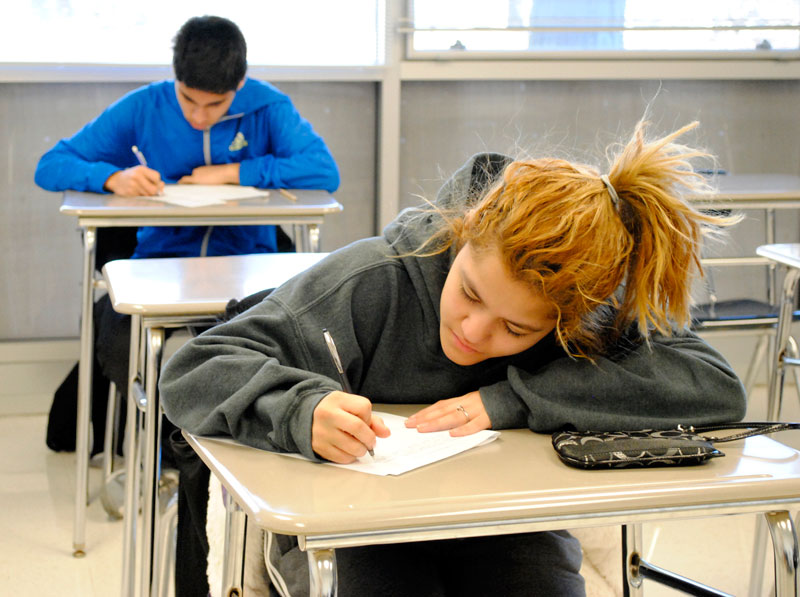Tips for Test Takers: PSAT/SAT
Apr 9, 2018
Testing season is here for Niles West students. Freshmen and juniors will be taking the PSAT and SAT tomorrow, Tues., April 10, and the stress can be a lot to deal with, so here are some tips to survive testing day.
1. For freshmen PSAT takers: Take it seriously. It’s tempting to just slack off, fill in random bubbles and take a nap for the rest of the day since this test does’t count towards your grades, but the PSAT is very helpful for planning your future. The PSAT is similar to the real SAT, so if you try your hardest, you can get the general idea of what your future score may be. If you get a 1400 on your PSAT, you know you don’t have to spend the next year in SAT prep classes. If you’re unhappy with your score when you gave it your best effort, you might have to dedicate a lot of time to studying and prepping in the near future. Excessive studying isn’t necessary, but take the allotted time to take the PSAT as you would the SAT.
2. For junior SAT takers: The day before the SAT is not the time to start studying. This tip is not going to be me telling you to study, because if you haven’t yet, there’s no point. Allow me to bestow upon you the advice I was given my freshmen year by a teacher: “If you don’t know it, you don’t know it.” There’s no point staying up until 3:00 a.m. to study a subject that you just don’t understand. If you don’t understand it by 11:00 p.m., you aren’t going to understand it by 3:00 a.m. Get a good night’s sleep before the test instead of cramming the night before.
3. Meditate before and after the test. It’s chaotic and stressful, and your heart will be pounding from start to finish. If your body is stressed, it makes your brain stressed too, and it will paralyze you during a very important moment in your high school career. Try and calm down beforehand. Grab a thermos with a warm drink and download an app like Headspace or Calm that provides guided meditation. It will help you calm down before and after the test. Afterwards it is just as important to let out all the built up stress you absorbed during the test, enabling you to enjoy the rest of your day.
4. Get to school early. The cafeteria provides free breakfasts to fill you up before the test so you aren’t hungry. Make time to use the bathroom and fill up your water bottle before, because hell will freeze over before a teacher allows you to leave the room during the SAT. This also gives you time to find your testing classroom, instead of being late and running around the school looking for a classroom that apparently is located on the non-existent fourth floor.
5. While waiting for the test to start, quickly look over the practice book provided to you. Search for questions you don’t understand and brush up on the answers. A quick brain exercise can get you in the mood to fill in bubbles for a few hours. Being half asleep at the start of an important test can set you on a bad path, so warming up with a few practice problems out of the booklet preps your brain to be a master of test taking.
Even if you only do a few of these tips, these should help you keep calm and focused for the duration of the testing period. Keep a positive outlook and good luck on the P/SAT.





Customwritings • Apr 10, 2018 at 11:17 AM
The SAT definitely has been dumbed down on the verbal side over the years (e.g., 1. hard vocabulary words have been eliminated, 2. analogy questions have been eliminated, 3. more context is now being given in the text of the text itself to allow the test-takers to figure out on the fly what hard or unfamiliar words mean, etc.). As a result, many students can score much higher on the verbal SAT than in years past without having worked hard over the years (or even in the months prior to the SAT test administration) to attain and maintain an excellent vocabulary. So those students with top vocabularies are finding this is not as much an advantage to them as it was for SAT test-takers two or three decades ago (i.e., less proficient students are readily getting the same or close to the same scores as they are getting). It doesn”t appear, however, that this is the case on the math SAT sections. The math SAT is still very challenging. Perhaps many of the Ridgewood High School students benefiting the most from SAT tutoring are making up for not working as hard as they should have in math from grade 6 or 7 onward, or for having had teachers or lower level classes during those grades that didn”t challenge them or that didn”t prepare them adequately to score very well on the math sections of the SAT.